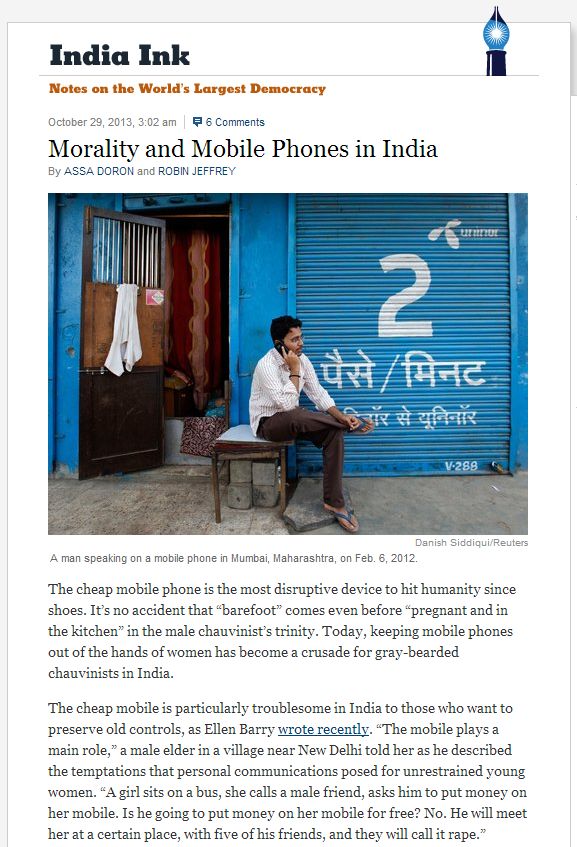Mobile empowers Indians despite moral concerns

I came across an interesting blog post on The New York Times (NYT) website, titled "Morality and mobile phones in India", which I thought was a somewhat biased and negative piece about how Indians use mobile phones.

Perhaps I took offence to this as I've been living in India for quite some time and don't look at the country's mobile phone penetration and usage from the NYT blogger's perspective. His views emphasized how landlines were once only used by the elite and suggested mobile phones were used for rape and pornography.
That said, while everyone is entitled to their opinions, as am I, I would like to shed some light on the positive enhancements mobile devices have brought about for the Indian society.
It's true that obtaining a landline in India could take years, but it wasn't only available for the elite. More importantly, the blogger made it sound like India was an ancient civilization until only recently, where landlines rarely existed, and mobile phones have come to the rescue. This was just one fallacy, in my opinion, of many. Landlines have in fact been around for years and while not every household had one, landlines had been in existence and available for the common man.
Perhaps the elite had connections or simply paid someone off to skip the queue to access one more quickly, but generally speaking, yes, it was true that it would take years to obtain a landline. Clearly, in this aspect, the introduction of mobile phones has solved the issue of accessibility, and many people here now also have more than one number.
The obvious results are people in India simply are more connected than before, and can easily access apps and smartphones.
The NYT post also made reference to how two New Delhi students in 2004 used a cellphone to make a video of "an intimate moment", which went viral and was shared through MMS, and suggested incidents like this highlighted India's struggle with mobile and morality. However, India is not the only country where its citizens capture personal and intimate images and videos on mobile devices, and, if anything, should not be singled out for this.
Also, the NT post cited "a male elder in a village" who was describing the role of mobile devices and "temptations personal communications posed to unrestrained young woman". "A girl sits on a bus, she calls a male friend, asks him to put money on her mobile. Is he going to put money on her mobile for free? No. He will meet her at a certain place, with five of his friends, and they will call it rape," he was quoted to say.
Read this
That a male friend who meets a female friend to top up the credit on her mobile phone, can be deemed a prelude to rape, is simply absurd to me. So does that mean women should be wary of men who ask to meet in person so they can up credit for their phones? As with other instances, trust depends on how well you know a person, but the blogger seems to suggest this is common practice: Women meet men, and men rape women.
I think the blogger has read too many negative articles and reviews about India, and has simply ignored the positive impact mobile adoption has had on the country. Tragic situations can arise anywhere, anytime, not just in India. While I don't deny these can happen here, I feel that it's wrong to highlight India as a hotbed for such acts.
Furthermore, India is not the only country where mobile pornography exists. Let's be frank, it's happening all over the world, even in countries where it's supposedly banned. To single out India, in a 2013 blog post, over one incident that dates back to 2004 involving an intimate moment between two high school students... Was that the best defense the NYT blogger could come up?
Furthermore, I highly doubt that one incident years ago spawned the idea for enterprising individuals to get into the phone porn business, as the blogger suggested. The reality is that almost everyone who has online access in India can access adult entertainment. Now, with the all the cables, gadgetry, and memory cards that come bundled with phones now, anyone can easily upload porn to their phone. The unfortunate reality is that even those who don't have online access or generally come from rural India also turn to market players for porn, and this is something the authorities turn a blind eye to.
Those who have lived in the country would be able to see how mobile phones, in fact, have benefited Indians of all ages and social classes. Simply put, Indians are not animals, there are human beings and I really feel the NYT blogger has failed to realize this.
I feel the world should look upon India's mobile phone penetration and usage as an example, especially when compared to the West. Mobile phones are more affordable in India, especially the local brands, and the best part is they're all unlocked. Above all, mobile rates and data plans are the rock-bottom affordable, which have helped pushed 75 percent of Indians to have at least one mobile phone connection.
We need to realize the empowerment mobile phones give to all Indians, be it the auto-rickshaw driver, the person selling vegetables in the bazaar, working professionals, and so on. This freedom and access to information which weren't available 10 years ago, are now easily available to many in the country.